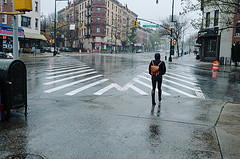NYC Hotels Double Rates On Some Guests, But Is It Gouging? Image courtesy of (JoelZimmer)
This is especially true for people who booked their rooms through sites like Orbitz, Priceline, Expedia, etc., where the rate charged is often a fraction of the rack rate charged to suckers who walk in off the street. But now that there are packs of stranded tourists, many hotels are no longer allowing such deep discounts on those booking sites.
Take for instance, the story of Heather and her boyfriend, who had spent Sunday and Monday at a Midtown hotel for around $110/night. Tonight they are paying $250 at the same hotel.
“I asked why and they said it was due to ‘occupancy’ and that I should ‘be thankful because they were charging walk-ins last night a rate of $385 a night,'” Heather tells Consumerist. “We paid the price and we’re still here because we have nowhere else to go.”
The big question: Is this gouging?
Earlier this week, New York state Attorney General Eric Schneiderman issued a public warning to businesses not to increase prices during Hurricane Sandy without a direct correlation to a cost increase for the business.
Oddly enough, while the letter specifically calls out “supermarkets, gas stations, hardware stores, bodegas, delis, taxi and livery cab drivers,” it doesn’t mention hotels, one of Manhattan’s biggest industries. It also doesn’t exclude hospitality.
Part of the problem with determining when a hotel is gouging is the whole rack rate concept. Only the smallest percentage of hotel guests pay the full rack rate. Given the popularity of online booking sites — and the fact that most of them offer the same discounts — many guests are probably only paying around 50-65% of that rack rate, possibly less.
But a search of Heather’s hotel on Orbitz and other sites shows a rate of $259 on a posted rack rate of $288. So while Heather and the other guests who have no other place to go can claim that their rate has more than doubled, the hotel could argue they are only charging 90% of the rack rate.
Back in 2006, then-AG Eliot Spitzer penalized an upstate NY Best Wester $7,500 for hiking its room rates from an average of $79.95/night to $150 when flooding stranded guests. However, in that case, the hotel did have maximum rack rates listed at $99.85 for a double and $110.95 for a king room.
To properly evaluate Heather’s case, we’d need to see what this hotel charges on average for rooms. If it’s always significantly lower than the rack rate, then you could make the case that the rack rate is over-valued and that anything approaching that number would be gouging.
We have suggested to Heather and other travelers in her situation that if they believe they are being gouged to file an official complaint with the AG’s office, as that is the primary way that any long-term changes will occur. It’s also probably her best chance for a refund, though it could be quite a long time before she got that money back.
We’ve written to both the hotel and the AG’s office to get comment on this story and will update if we hear anything back from either party.
Want more consumer news? Visit our parent organization, Consumer Reports, for the latest on scams, recalls, and other consumer issues.


